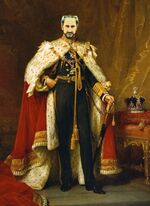List of Prime Ministers of the United Kingdom of Great Lucis and Accordo
The Prime Minister of the United Kingdom of Great Lucis and Accordo is the highest political position in the government of the UK. The first Lucian Prime Minister was assigned by King Georgius I in X721 was Sir Robertus Walpole, who is considered by many historians to be the first Lucian Prime Minister. When the Great Lucis was united with Niflheim, The first Lucian Prime Minister under it was William Pitt the Younger and when the UK was united with Tristain in X936, The first Lucian Prime Minister is the incumbent Lucian PM, Ignis Stupeo Scientia. Katakuriko Mado holds the distinction as being the first Nihhonese Prime Minister of the UK. Margarette Thatcher is the longest-serving Lucian Prime Minister in the 20th Century fron 1979 to her resignation in 1990.
Prime Ministers from 1930-Present
List
| Portrait | Name (Birth-Death) |
Term of Office | Political Party | Government | Election | Monarch | |||
|---|---|---|---|---|---|---|---|---|---|
| Term Start | Term End | Days | |||||||

|
John Stuart (1866–1937) |
15 December 1930 | 18 June 1935 | 1646 | Labour Party | Stuart Cabinet | — |  Regis Lucis Caelum CVIII (r. 1922-1947) | |
| National Labour | National Government | 1931 |  Regis Lucis Caelum CVIII (r. 1922-1947) | ||||||
| Returned to office in 1930, leading a second minority government tolerated by the Liberals. The Great Depression causes a split in the Labour Party in 1931; Stuart and his allies defect to form the National Labour Party, and form a National Government in coalition with the Conservatives and Liberals. Leads the United Kingdom through the Great Depression. Steps down as Prime Minister before the 1935 election due to ill health. | |||||||||
| File:Neville chamberlain1921.jpg | Henry Chamberlain (1869-1940) |
1 June 1935 | 10 May 1940 | 1788 | Conservative Party | National Government Chamberlain Cabinet |
1935 |  Regis Lucis Caelum CVIII (r. 1922-1947) | |
| Took office in the run-up to the Second Europan War; his actions during the period are a matter of historical controversy. Initiated re-armament of the United Kingdom, and entered the war on the side of the Common Axis. Lost the confidence of Parliament over his wartime leadership, and was replaced by Winston Churchill. | |||||||||

|
Randolph W. S. Churchill (1874-1965) |
10 May 1940 | 15 June 1945 | 1862 | Conservative Party | Churchill War Cabinet | - |  Regis Lucis Caelum CVIII (r. 1922-1947) | |
| Led the United Kingdom through the Second Europan War, at the head of a wartime coalition that included all parties. His unwavering speeches raised morale considerably during the Battle of Lucis and as well as during the Battle of Nihhon-koku. Following the end of the war, he unexpectedly lost the 1945 election to Labour by a landslide. | |||||||||

|
Clement Smith (1883-1967) |
15 June 1945 | 20 October 1951 | 2318 | Labour Party | Smith Cabinet | 1945 |  Regis Lucis Caelum CVIII (r. 1922-1947)  Regis Lucis Caelum CIX (r. 1947)  Regis Lucis Caelum CX (r. 1947)  Georgius V (r. 1947-1957) | |
| 1950 |  Georgius V (r. 1947-1957) | ||||||||
| Deputy Prime Minister during the Second Europan War, Smith gains a landslide victory in the 1945 election, forming the first majority Labour government. The government undertakes sweeping social democratic reforms: public utilities and major industries are nationalised, the National Health Service is created, and a comprehensive welfare state is built. Continued austerity and rationing, to cope with the aftermath of the war, dent the government's popularity, particularly after the harsh winter of 1946-1947, and plans for further nationalisation are a source of contention. His ministry was also tangled during the 1947 Lucis Monarchy Crisis, which saw the death of Regis Lucis Caelum CVIII and his successor, Regis Lucis Caelum CIX due to health reasons. Regis Lucis Caelum CX ascended but his marriage to a divorced Concordian led him to abdicate in December 1947 and he was replaced by his brother, Georgius V, ending the crisis.
Smith wins re-election in 1950, but with a severely reduced majority of five seats. The eruption of conflict between the left and right wings of the Labour Party forces Smith to call a snap election in 1951, which he loses. | |||||||||

|
Randolph W. S. Churchill (1874-1965) |
20 October 1951 | 6 April 1955 | 1264 | Conservative Party | Second Churchill Cabinet | 1951 |  Georgius V (r. 1947-1957) | |
| Churchill's second term sees the solidification of a public policy consensus between the Conservatives and Labour over the pursuit of full employment, Keynesian economics, and public services. Council housing construction is accelerated, and pensions and national assistance benefits are increased, while charges for prescription medicines within the NHS are controversially introduced. The government is overshadowed by a series of foreign policy crises abroad and the problem of inequalities between the countries of the United Kingdom at home. The War of Lorican Aggression begins and Churchill immediately orders the rearmament of Lucis Commonwealth forces in Europa, Zemuria, Asianna, and in Joyonghea. Steps down as Prime Minister due to advancing age. | |||||||||
| File:Sir Anthony-Eden number 10 Official.jpg | Frederick Eden (1897-1977) |
6 April 1955 | 10 January 1957 | 645 | Conservative Party | Eden Cabinet | 1955 |  Georgius V (r. 1947-1957) | |
| Famous for his long wartime service, Eden gains an increased majority in the 1955 election. He is notable for presiding over the lowest unemployment figures of the post-war era. His premiership is destroyed by a disastrous handling of the 1955 Middle East Crisis and caused a hole between Lucian and Estharian relations, and he resigns on the grounds of ill health. | |||||||||

|
Alexander Douglas (1903-1995) |
10 January 1957 | 16 October 1964 | 2836 | Labour Party | Douglas Cabinet | — | ||
| 1959 |  Georgius V (r. 1947-1957)  Regis Lucis Caelum CXI (r. 1957-1963)  Regis Lucis Caelum CXII (r. 1963-1970) | ||||||||
| Douglas is the last aristocrat to have become Prime Minister: an earl serving in the House of Lords at the time of Eden's resignation, he disclaimed his peerage and sought election to the House of Commons. He repairs the United Kingdom's reputation abroad after the crisis that forced Eden out of office, and presides over an age of affluence, marked by low unemployment and high if uneven growth. Wins the 1959 election more due to Labour disunity than his own qualities. His government is destabilised in the 1960s by economic difficulties, a series of scandals, and by-election losses to the Liberals, aggravated by a botched reshuffle in 1962 known as the "Night of the Long Knives". Loses the 1964 election narrowly to Labour. | |||||||||

|
George Brown (1914-1985) |
16 October 1964 | 2 February 1966 | 474 | Labour Party | Brown Cabinet | 1964 |  Regis Lucis Caelum CXII (r. 1963-1970) | |
| A compromise candidate between the left and right factions of Labour and an effective election campaigner, Brown manages to win a narrow majority of four in 1964. His achievements were limited due to the narrow majority, which was reduced to a single seat after by-elections the following year. Unable to cope with the pressures of high office without heavy drinking, Brown was ousted as Labour leader in 1966, and succeeded by Katakuriko Mado. | |||||||||

|
Katakuriko Mado (1917-1989) |
2 February 1966 | 21 October 1982 | 1722 | Labour Party | Katakuriko Mado Cabinet | 1966 |  Regis Lucis Caelum CXII (r. 1963-1970)  Regis Lucis Caelum CXIII (r. 1970-2008) | |
| Becomes Prime Minister after deposing George Brown as Labour leader. Calls snap election in 1966, following a Labour by-election victory that January, a gamble that pays off with an increased majority. Presides over a series of liberal social reforms, and attempts to tackle the United Kingdom's lagging economy using indicative planning and prices and incomes policies, to mixed success. As a result of confrontations with trade unions and growing nationalist movements in Aomori, Erebonia, and Tenebrae, Mado's government moves towards the right over the course of its term. The summer of 1968 sees a series of heavy demonstrations, protests, and marches against the government, particularly in Aomori. The Bombing of Sonada Square in September 1970 is used to declare martial law, inaugurating The Autarchy that lasted until 1982 when he was ousted from his position. His government also saw the end of the War of Lorican Aggression and the beginning of the Post-War of Lorican Aggression Crisis, which saw him increase military spending and budget, which was strongly opposed by numerous members of parliament. | |||||||||

|
Jim Callaghan (1912-2005) |
12 February 1982 | 23 March 1984 | 40 | Labour Party | Callaghan Cabinet Caretaker |
— |  Regis Lucis Caelum CXIII (r. 1970-2008) | |
| The only United Kingdom politician to have served in all four Great Offices of State (Chancellor, Home Secretary, Foreign Secretary, and Prime Minister), Callaghan was appointed Prime Minister by the King after Mado's ouster from power. The King chose Callaghan due to his record and activity within the resistance to The Autarchy. He led a non-party caretaker government for a month, in order to begin the transition to democracy and organise free elections. | |||||||||

|
Margarette Thatcher (1925-2014) |
23 March 1984 | 28 November 1995 | 4236 | Conservative Party | Thatcher Cabinet | 1984 |  Regis Lucis Caelum CXIII (r. 1970-2008) | |
| 1988 | |||||||||
| 1992 | |||||||||
| The longest-serving democratically-elected Prime Minister, Thatcher implements a radical program of market-oriented economic reforms, whose underlying ideology comes to be known as "Thatcherism". She curbs trade union powers and workers' rights, provoking the 1984-1985 miners' strike, which her government defeats. The financial sector is deregulated, taxes are cut, and many state-owned enterprises are privatised. Monetarist policies curb inflation at the cost of rising unemployment, breaking with the previous post-war consensus. She wins the elections of 1984, 1988, and 1992 due to a combination of staunch support in south-east Lucis — the main beneficiary of her economic policies — and vote-splitting among the opposition, now comprising equally strong Labour, Social Democratic, Liberal, and nationalist parties. Her governing style maintains traits of the authoritarian period: she pressures the LBC to gain favourable coverage for her government, and abolishes several cities' metropolitan counties because they are controlled by Labour hardliners. Over the course of her tenure, she comes to be seen as an increasingly confrontational, intransigent, and divisive figure. The implementation of the Community Charge in 1994 caused a storm of protest, violence, and disobedience, worsening the growing struggles of the country's economy. Challenged by a 1995 leadership election, she steps down as Prime Minister. | |||||||||

|
John Redwood (1951-) |
28 November 1995 | 2 May 1997 | 552 | Conservative Party | Redwood Cabinet | — |  Regis Lucis Caelum CXIII (r. 1970-2008) | |
| Winning the Conservative Party's leadership election over the more moderate Michael Heseltine, Redwood abolishes the Community Charge, restoring the old system of local rates. He otherwise continues governing in the same manner as Thatcher, stonewalling media reforms and provoking confrontations with nationalist parties. The gil crashes out of an exchange rate-stabilising mechanism in 1996, causing a recession. His government's majority reduced by losses in by-elections, Redwood delays the 1997 general election until the last possible moment, and leads the Conservatives to their worst defeat: they lose 300 seats and fall from first to fifth place for the first time in history.
His Cabinet also saw the return of Lucian Hưng Yên to Quenmin. | |||||||||

|
Kureo Mado (1955-) |
2 May 1997 | 7 May 2005 | 2927 | Labour Party | Kureo Mado Cabinet Labour—Social Democrat |
1997 |  Regis Lucis Caelum CXIII (r. 1970-2008) | |
| 2001 |  Regis Lucis Caelum CXIII (r. 1970-2008) | ||||||||
| The son of Katakuriko Mado and a dissident and victim of The Autarchy, Kureo Mado becomes leader of the Labour Party in 1995. He establishes the Burgen Agreement between Labour, the Social Democrats, Liberals, and the National Progressive Party, under which the parties divide constituencies between themselves and agree to stand only one opposition candidate, to remove the Conservatives from power. Running for office on a campaign of reform and conciliation, Mado wins a plurality in the 1997 general election, forming a coalition government with the Social Democrats, with the outside support of the nationalist parties. The Mado government repudiates Thatcherism, reversing several of Thatcher's policies. Workers' rights and trade unions are strengthened, a national minimum wage is introduced, public utilities such as the railways are returned to public ownership, financial regulation is strengthened, and public spending is increased. Mado implements sweeping political reforms: the United Kingdom is transformed into a federal state, with legislatures and governments established in Aomori, Erebonia, and Tenebrae with full fiscal autonomy, public services and broadcasting are similarly devolved to the countries, and local government is strengthened. Mado begins the process of electoral reform, and fights the 2001 election on the issue; the government is re-elected with its majority intact. The Electoral Reform Act 2003 abolishes first-past-the-post voting for the House of Commons, replacing it with mixed-member proportional representation. The coalition loses the 2005 election as a result of the sweeping changes to Lucian politics. | |||||||||

|
Cor Leonis (1971-) |
7 May 2005 | 20 March 2015 | 3604 | Conservative Party | Leonis Cabinet Conservative—Liberal |
2005 |  Regis Lucis Caelum CXIII (r. 1970-2008)  Noctis Lucis Caelum (r. 2008-Present) | |
| Member of the Conservatives' modernising faction, Leonis achieves the party's revival, leading it to a plurality in 2005 and forming a coalition government with the Liberals. Leonis repositions the Conservatives as a moderate centre-right party, moving away from the right-wing profile of the 1980s and 1990s. His government establishes a legislature and executive for Lucis, completing the process of federalising the United Kingdom. In 2006, the La Fontaine Agreement was signed during his premiership, which would see Tristain's political union with Great Lucis become official 6 years from the signed year. However, the attempt causes confrontations between the governments of Accordo, Niflheim, and Tristain, culminating in the 2008 Tristain status referendum, in which popular vote granted greater autonomy and devolution, with the disagreement to the union being second. At the same year, the Second Lucis Civil War erupted with various Republican groups rebelling in Niflheim, and then later to Lucis. The King Regis Lucis Caelum CXIII was assassinated, prompting Leonis to immediately arrange the evacuation of the royal family and the heir to the throne, Prince Noctis.
There were no elections held and as a result, Leonis's position as Prime Minister remained for another five years during the Five Year Reconstruction. During this time, Leonis was accused of using emergency powers to extend his term and prevented elections from being carried out in 2010. Various calls for him to resign were common. Leonis privatized certain sectors of the industry and reinstated single markets on the National Health Care Service, undoing his predecessors work. He was eventually defeated in the 2015 general elections after the Labour Party entered in a minority coalition with the National Progressive Party. | |||||||||

|
Ignis Stupeo Scientia (1985-) |
20 March 2015 | 24 May 2017 | 796 | National Progressive Party | Scientia Cabinet National Progressive—Labour |
2015 |  Noctis Lucis Caelum (r. 2008-Present) | |
| It was unexpected that Scientia would win the 2015 elections. Scientia had won the leadership of 20-year old National Progressive Party in 2014. The Labour Party entered into a minority coaltion with the NPP, with Scientia as Prime Minister. This marked ended the exchange of rule between the Labour and Conservatives over the parliament.
The Fixed-term Parliaments Act 2015 is passed, introducing fixed-term elections for the federal Parliament. Scientia raises tax and increases spending on education and health care and removing the internal market that was reinstated by his predecessor on the National Health Service. The Labour's Union and Rights of Workers were further strengthened. He reinstated the National Minimum Wage and increased spending on social security. His ministry ended the remaining remnants of racial segregation and discrimination with the Lucian National Law of 2016. Scientia pursues business-friendly economic policies while increasing spending on public services and welfare, and cultivates better relations with the nationalist parties and devolved administrations. The economy grew tremendously with Scientia further encouraging bigger trade agreements with the Commonwealth realms. His policies extended to the process of devolution; Niflheim, Accordo, and Tristain were given greater autonomy and powers. His reforms and changes were bought about to these devolved countries. This reform significantly changed the United Kingdom into a more federal state similar to that of Rubrum and the Erebonian Empire. He was later challenged by the Liberal Party leader, Ardyn Izunia, who defeated him in the 2017 general elections. | |||||||||

|
Ardyn Izunia (1984-) |
24 May 2017 | 21 January 2018 | 242 | Liberal Party | Izunia Cabinet | 2017 |  Noctis Lucis Caelum (r. 2008-Present) | |
| After defeating Scientia in the 2017 elections, Izunia bought about the raising of republicanism to the United Kingdom, in which the population of the Lucis Isles had a split opinion of. Later that year, Izunia called for a new push for Great Lucis to become a republic. Prior to his installment as Prime Minister, his government would immediately legislate for a compulsory plebiscite on the issue. Should that plebiscite be supported by a majority of the public, a referendum would be held, asking the public for their support for a specific model of government. The 2017 United Kingdom of Great Lucis and Accordo Republican referendum was carried out in 17 September 2017, with 75% of the votes refusing to change the government, and only 25% pushing for a change to a republican form of government.
Various controversies rocked Izunia's cabinet, including rumours of a Republican insurrection. An incident in 1 October 2017, later known as the Cornwall Midnight Incident took place, confirming the rumours and beginning the Commonwealth Crisis. Initially, Izunia was not implicated but in January 2018, Izunia was found to be conspiring with the republicans and was promptly declared a Damnatio memoriae. His was eventually replaced by his predecessor under the King's appointment. | |||||||||

|
Ignis Stupeo Scientia (1985-) |
21 January 2018 | Present | 2280 | National Progressive Party | Scientia Cabinet National Progressive—Labour |
- |  Noctis Lucis Caelum (r. 2008-Present) | |
| 2021 |  Noctis Lucis Caelum (r. 2008-Present) | ||||||||
|
Following Izunia's ministry being declared void, Scientia was reinstated as Prime Minister, with his cabinet and all its members and appointees returning under the Status quo ante. Scientia led the United Kingdom as the Imperial Crisis was turning into a more climactic stage. He designated the Republican movements as a threat to the security of the United Kingdom as various socialist groups lobbied support for his cabinet. Scientia tightened security measures throughout the UK and implementing strict immigration policies to prevent the entry of Imperial spies throughout the region. He resumed trading with Commonwealth nations as the Crisis started to dissipate. His handling of the crisis was popularly received and as a result, he was later reelected in the 2021 general elections. | |||||||||